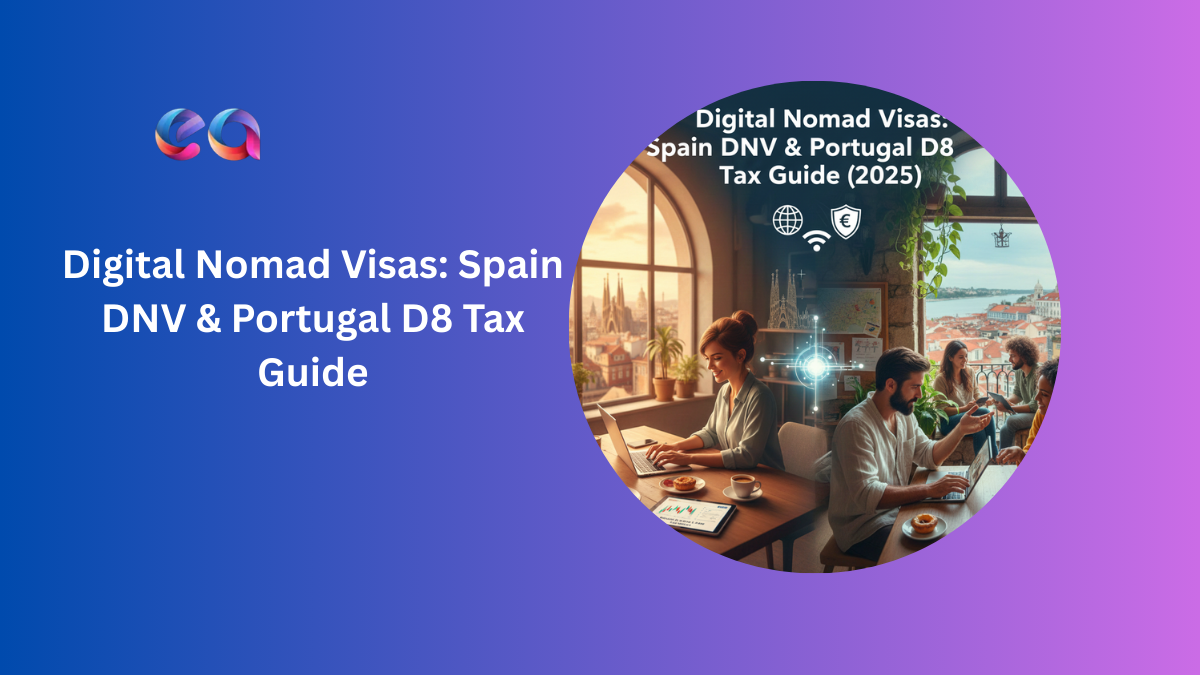
The dream of location independence has evolved from backpacking to a sophisticated, long-term lifestyle, demanding legal residency and tax compliance. As the world of remote work professionalizes, merely traveling on a tourist visa is no longer viable for the serious digital nomad. Two countries in Europe have emerged as the gold standard for remote workers seeking a stable, legal, and financially savvy base: Spain and Portugal.
But the landscape is complex. Spain has introduced its landmark Digital Nomad Visa paired with the lucrative Beckham Law tax regime, while Portugal has transitioned from the renowned NHR (Non-Habitual Resident) scheme to the new, targeted IFICI (NHR 2.0) incentive, available through the successful D8 Visa. Navigating these shifting waters requires meticulous planning, a deep understanding of tax residency rules, and the correct international health insurance.
This comprehensive guide serves as your essential playbook. We will break down the precise requirements for the Spanish and Portuguese Digital Nomad Visas, provide a detailed analysis of the tax implications (including the critical Beckham Law and Portugal’s NHR 2.0), and compare the top international health insurance providers that meet mandatory visa criteria. Prepare to transform your remote work journey from a temporary trip into a legitimate, financially optimized lifestyle.
Table of Contents
Spain – The Digital Nomad Visa & The Game-Changing Beckham Law
Spain has firmly cemented its position as a top digital nomad destination with the launch of its specific visa for remote workers (under the Startup Law). Critically, for many high-earning professionals, this visa can be paired with one of Europe’s most advantageous tax regimes: the Beckham Law.
The Spanish Digital Nomad Visa: Pathway to Residency
The Spanish Digital Nomad Visa (DNV) is a non-lucrative residence permit designed specifically for non-EU nationals to reside and work remotely in Spain.
Key Requirements and Eligibility:
- Non-EU/EEA Nationality: Must be a citizen of a country outside the European Union and the European Economic Area.
- Proof of Remote Work: You must demonstrate that you are working for a company or client located outside of Spain. This requires:
- A contract showing the employment relationship is at least three months old.
- Proof that the company has been operating for at least one year.
- Crucially, you must guarantee that your work activities will largely remain outside of Spain. You may only earn up to 20% of your total income from Spanish companies or clients.
- Income Threshold (Financial Means): This is one of the most critical aspects. Applicants must prove a stable, average monthly income equivalent to at least 200% of the Spanish minimum monthly wage (SMI).
- Note: The SMI is subject to annual change. As of the projected date of this article, this threshold typically translates to a monthly income of approximately €2,500 – €3,000 for the main applicant.
- The income requirement increases for dependents: an additional 75% of the SMI for the first dependent, and 25% for each subsequent dependent.
- Clean Record: A clean criminal record certificate from every country you have resided in for the past two years.
- Health Insurance: Proof of private health insurance valid for the entire duration of your stay in Spain. This must be a policy with an insurer authorized to operate in Spain, providing coverage equivalent to the Spanish National Health System (i.e., no deductibles, co-payments, or waiting periods).
Application Process and Duration:
Initial Visa: You apply at the Spanish Consulate in your country of residence. This typically grants a visa for up to one year.
Residence Permit: Once you are in Spain, you must apply to the Unidad de Grandes Empresas y Colectivos Estratégicos (UGE) within your first three months of arrival for the residence permit.
Renewal: The residence permit is issued for three years and can be renewed for an additional two years, leading to eligibility for permanent residency after five years.
Tax Implications: The Beckham Law Deep Dive
The Beckham Law (officially Régimen Especial para Trabajadores Desplazados) is the Spanish DNV’s primary competitive advantage, but it is often misunderstood. It is a special tax regime, not an automatic benefit of the visa.
What is the Beckham Law?
The standard Spanish tax system requires residents (those spending more than 183 days a year in Spain) to pay progressive taxes on their worldwide income, with rates potentially reaching 47% for high earners.
The Beckham Law allows eligible new residents to choose to be taxed as non-residents for their first six years in Spain.
- Flat Tax Rate: Taxed at a flat rate of 24% on Spanish-sourced income up to €600,000.
- Foreign Income Exemption: You are generally exempt from paying Spanish income tax on most income earned outside of Spain (e.g., passive income like dividends, interest, and capital gains from foreign assets).
- Wealth Tax: You are only taxed on assets held in Spain, not your worldwide wealth.
Eligibility for Digital Nomads (A Critical Checkpoint):
While the DNV is designed for freelancers and remote workers, the Beckham Law has strict eligibility criteria that must align with your work structure.
- New Arrival Rule: You must not have been a Spanish tax resident in the five years preceding your relocation.
- Relocation for Work: Your move must be due to an employment contract or professional relationship with an entity in Spain or abroad.
- The Employment Structure Test: This is the biggest hurdle for digital nomads:
- ✅ QUALIFIES: You are an employee transferred to Spain by a foreign company, OR you are an employee of a foreign company who applies for the DNV, and that foreign company is willing to register with the Spanish Social Security system and make contributions for you.
- ❌ DOES NOT QUALIFY: You are a self-employed freelancer (Autónomo) working for multiple foreign clients UNLESS you meet very specific criteria related to being a director of a foreign company, which requires expert legal consultation.
Crucial Insight: The biggest pitfall is the Social Security requirement. Most small or mid-sized foreign companies are reluctant to register with Spain’s Social Security. If your employer refuses, you cannot access the Beckham Law benefits, and you will be taxed on your worldwide income at the standard progressive Spanish rates.
Application Window:
If you qualify, you must file Form Modelo 149 with the Spanish Tax Agency (AEAT) within six months of your registration with Spanish Social Security or the start date of the activity in Spain. Failure to meet this deadline is final.
Portugal – D8 Visa and The New IFICI (NHR 2.0) Regime
Portugal, long considered the DN capital of Europe, has significantly altered its tax landscape. The popular NHR regime ended, but it has been replaced by the Tax Incentive for Scientific Research and Innovation (IFICI), often called NHR 2.0, which continues to offer compelling tax incentives for qualified professionals arriving on the D8 Visa.
The Portugal D8 Visa: Remote Work Residency
The Portugal D8 Visa is specifically for digital nomads and remote workers. It is a long-term residency visa (not just a short-term stay) with a clear path to permanent residency and citizenship.
Key Requirements and Eligibility:
- Non-EU/EEA Nationality: Similar to Spain, this is for third-country nationals.
- Income Threshold: You must prove an average monthly income for the last three months equivalent to at least four times the Portuguese minimum wage (RMMG).
- Note: Based on the projected 2025 RMMG, this threshold is approximately €3,280 – €3,480 per month for the main applicant.
- This income must be passive income (D7 Visa) or, for the D8, must come from remote work (employment contract or proof of service provision to foreign clients).
- Accommodation: Proof of a long-term rental contract (ideally 12 months) or property ownership in Portugal.
- Health Insurance: Mandatory private health insurance with a minimum coverage of €30,000 for the duration of the initial visa/residency period.
- Clean Record: Criminal record certificate from your country of origin and any country you have resided in for the past year.
- Family Inclusion: The D8 Visa allows for family reunification. You must demonstrate slightly higher income requirements for your spouse and dependent children.
Application Process and Duration:
- Visto de Residência (Visa Application): Apply at the Portuguese Consulate in your country of residence. This typically grants a 4-month visa.
- Residência Permit (AIMA Appointment): Upon arrival, you must attend an appointment with the Agência para a Integração, Migrações e Asilo (AIMA, formerly SEF) to convert your visa into a Residence Permit.
- Renewal: The initial permit is usually valid for two years, followed by a three-year renewal. After five years of legal residency, you are eligible for Permanent Residency and can apply for Portuguese Citizenship.
Tax Implications: Decoding the IFICI (NHR 2.0)
The original NHR regime offered broad tax exemptions. The new IFICI regime is far more selective, targeting specific high-value professions in Portugal.
What is IFICI (NHR 2.0)?
The IFICI is a 10-year tax incentive regime aimed at attracting qualified professionals in areas deemed strategic for Portugal’s economy, such as science, technology, innovation, and education.
- Portuguese-Sourced Income: A flat tax rate of 20% on employment and self-employment income generated from approved “high value-added” activities within Portugal. This is significantly lower than the standard progressive rates which can reach up to 48%.
- Foreign-Sourced Income: Eligible beneficiaries benefit from a tax exemption (0% tax) on most foreign-sourced income, including freelance income from foreign clients and many types of investment/passive income, provided the source country has a double-taxation agreement (DTA) with Portugal.
Eligibility for Digital Nomads (The Selective Criteria):
The key difference from the old NHR is that simple remote work is no longer enough. You must qualify under a High Value-Added Activity (HVAA).
- HVAA List: While the exact list is updated, it typically includes:
- Directors and executive managers.
- Professionals in the fields of science, engineering, and technology (e.g., software developers, data scientists, and IT consultants).
- Academics and qualified teachers.
- Creative fields (e.g., designers, architects) and specialized consulting.
- New Tax Resident Rule: You must not have been a Portuguese tax resident in the five years preceding your IFICI application.
- Application: Must be applied for within six months of registering as a tax resident in Portugal.
Crucial Insight: If your remote work does not strictly fall into one of the designated HVAA categories, you will be subject to Portugal’s standard progressive tax rates on your worldwide income upon becoming a tax resident (staying more than 183 days). This is a major change and requires meticulous self-assessment or professional advice before relocation.
Essential Logistics – Co-Working and Community
Legal compliance is only part of the digital nomad experience. Finding community and a productive workspace is key to a successful long-term stay.
Co-Working Spaces: Lisbon vs. Barcelona
| Feature | Lisbon, Portugal (Focus: Community & Growth) | Barcelona, Spain (Focus: Design & Scale) |
| Vibe/Culture | Casual, laid-back, highly international with a strong expat focus. Start-up and creative feel. | Professional, design-forward, international business hub. Strong focus on large tech enterprises. |
| Top Spaces | Second Home Lisboa/Porto: High-end, jungle-themed. LACS: Trendy, former industrial space with city views. Outsite: Focused on co-living/co-working community. | OneCoWork: Premium, sleek, multiple high-traffic locations. Aticco Workspaces: Expansive, often with rooftop terraces and events. Mobility: Strong independent, local feel. |
| Pricing (Hot Desk) | Generally more affordable than Barcelona. Expect €150 – €250 per month. | Slightly higher than Lisbon. Expect €200 – €350 per month. |
| Networking | Highly community-driven events, language exchanges, and structured família nights. | More formal, business-focused networking events and professional workshops. |
| Key Takeaway | Lisbon offers an unparalleled sense of belonging and ease of entry into the DN community. | Barcelona provides highly professional infrastructure and a better bridge to the traditional European corporate world. |
The Ultimate Guide to International Health Insurance for Visa Compliance
Visa applications in both Spain and Portugal require mandator private health insurance. Choosing the wrong policy can lead to immediate visa rejection or financial disaster in an emergency. The key choice is between Travel Medical Insurance and International Health Insurance (IHI).
Travel Medical vs. International Health Insurance (IHI)
| Feature | Travel Medical Insurance (TMI) | International Health Insurance (IHI) |
| Primary Use | Short-term emergency medical care, trip cancellation/interruption. | Long-term, comprehensive coverage, including routine and preventative care. |
| Duration | Up to 12 months (non-renewable in most cases). | Renewable annually for many years. |
| Visa Compliance | Often NOT sufficient for the DNV/D8 Residence Permit phase. Policies may have exclusions/limits that don’t satisfy the “no co-pays/deductibles” rule required by Spain/Portugal. | Mandatory for long-term residency. Provides the comprehensive, local-equivalent coverage required by immigration authorities. |
| Coverage Scope | Acute illness, accidents, emergency evacuation. Routine check-ups are generally excluded. | Accidents, illness, hospital stays, outpatient care, often includes mental health, dental, and vision (as optional add-ons). |
Conclusion for Visas: For the long-term DNV (Spain) and D8 (Portugal) Residence Permit, you must secure an International Health Insurance (IHI) plan that specifically meets the “no co-pay/no deductible” requirement and is valid in the Schengen Area.
Top International Health Insurance Providers
For the long-term, compliance-ready IHI needed for the DNV and D8, these providers are highly recommended:
| Provider | Best For | Key Benefits for Nomads |
| Cigna Global | Comprehensive, customizable long-term coverage. | Extensive Global Network (1.5M+ providers). Highly flexible Silver, Gold, Platinum tiers. Excellent for families and those requiring specific modules (e.g., dental, vision). |
| GeoBlue | US Citizens needing global coverage. | Highly rated in the US for customer service. Plans like Xplorer offer unlimited annual/lifetime maximums and excellent preventative care access. |
| SafetyWing | Budget-conscious, flexible coverage (often used in the gap between Travel Medical and IHI). | Nomad Insurance is excellent Travel Medical. Their Remote Health product is their IHI solution, offering renewable, global coverage built for the remote worker lifestyle. |
| AXA Global Healthcare | Premium coverage with robust support. | Known for fast claims reimbursement (often within 48 hours) and extensive benefits like a 24/7 Virtual Doctor service and Second Medical Opinion. |
Summary of Tax Regimes and Final Decisions
Deciding between Spain and Portugal hinges entirely on your income structure, profession, and tolerance for administrative complexity.
| Feature | Spain (Digital Nomad Visa) | Portugal (D8 Visa) |
| Tax Regime | Beckham Law (24% Flat Rate) | IFICI / NHR 2.0 (20% Flat Rate) |
| Tax Eligibility | Requires Employee Status and the foreign company to register for Spanish Social Security. High complexity, but high reward. | Requires work in a High Value-Added Activity (HVAA) (e.g., Tech, Science, Management). More selective than the old NHR. |
| Standard Tax (If no benefit applied) | High progressive worldwide taxation (up to 47%). | High progressive worldwide taxation (up to 48%). |
| Monthly Income Min. | Approx. €2,500 – €3,000 (200% SMI). | Approx. €3,280 – €3,480 (4x RMMG). |
| Co-Working Vibe | Highly professional, business-focused (Barcelona). | Community-driven, creative, highly international (Lisbon). |
| Best For | High-earning employees whose foreign company will comply with Spanish SS. | Qualified freelancers/entrepreneurs in a designated “High Value-Added” sector. |
The Critical Decision Flowchart
Is your foreign employer willing to register for Spanish Social Security? If YES, Spain’s Beckham Law is a superior tax regime for global earners. If NO, Portugal’s IFICI (if you qualify as HVAA) is your next best option.
Are you a Non-EU/EEA Citizen? (Yes, proceed.)
What is your monthly income? If below €3,500, Portugal’s D8 might be more financially restrictive due to the higher RMMG multiplier.
What is your profession?
If a Software Developer, AI Expert, or Senior Manager: Both Spain (employee) and Portugal (HVAA) are excellent options.
If a General Freelance Writer or Marketing Consultant: Portugal’s IFICI may exclude you. Spain’s Beckham Law may exclude you unless your foreign employer is compliant. Be prepared for worldwide progressive tax in either country.
Disclaimer and Final Recommendation
The information provided in this guide is for informational purposes only and is not professional tax or legal advice. The Spanish and Portuguese tax and immigration laws are complex, subject to change without notice, and have severe penalties for non-compliance.
Always Consult an Expert: Given the crucial, high-stakes nature of the application deadlines and the complexity of the tax regimes (especially the subtle differences in Beckham Law and the selective nature of IFICI/NHR 2.0), the single most important step you can take is to hire a specialized International Tax Advisor or Immigration Attorney who is licensed to practice in your chosen country. This is not an area for DIY solutions.
By combining the legal residency status of the DNV/D8, the potential tax savings of the Beckham Law or IFICI, and a mandatory, compliant International Health Insurance policy, you can build a stable, prosperous, and truly legal digital nomad life in Europe.













